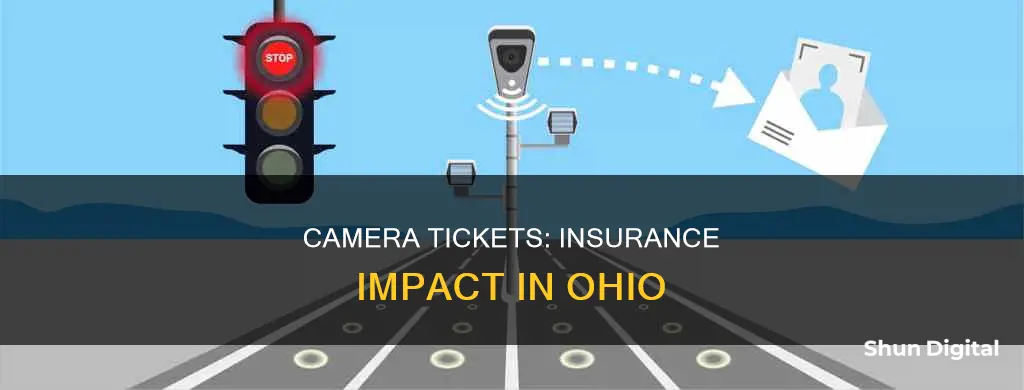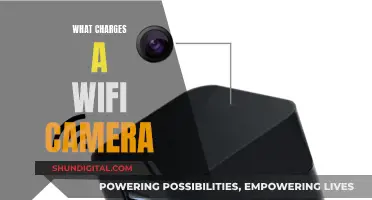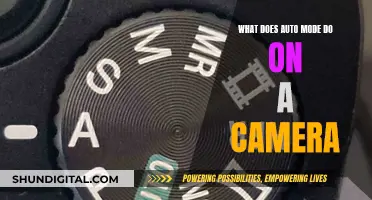
In Ohio, camera tickets are considered civil infractions and do not go on your driving record. This means that they generally do not affect your insurance rates. However, it's important to note that failing to pay a camera ticket can result in a driver's license suspension and higher insurance premiums upon renewal. Additionally, traditional speeding tickets, where a driver is pulled over by an officer, will appear on your driving record and impact your insurance rates.
| Characteristics | Values |
|---|---|
| Do camera tickets affect insurance in Ohio? | No, camera tickets are considered civil violations and do not affect insurance rates. |
| Are camera tickets enforceable in Ohio? | Yes, failure to respond to a camera ticket can lead to a driver's license suspension and higher insurance premiums. |
| What are the penalties for a camera ticket? | The main penalty is a fine, which is determined by how much the driver exceeded the speed limit. There is also a victim surcharge fee and a court fee. |
| Do camera tickets go on your driving record in Ohio? | No, camera tickets are not reported to the Ohio Bureau of Motor Vehicles and do not become part of the vehicle owner's driving record. |
What You'll Learn
- Camera tickets are considered civil violations and don't affect insurance
- Ignoring a camera ticket may lead to a court summons and higher fines
- Failing to pay a camera ticket can prevent you from renewing your license
- Camera tickets are enforceable and not paying can lead to a suspended license
- Ohio allows cities to install cameras to enforce traffic rules

Camera tickets are considered civil violations and don't affect insurance
Camera tickets, often regarded as civil violations, typically do not impact insurance rates. They are treated differently from traditional speeding tickets, which can result in increased insurance premiums. This is because camera tickets are issued to the registered owner of the vehicle based on the license plate captured in the photo, rather than to a specific driver. As a result, the violation is associated with the vehicle's plate and not the individual, preventing it from appearing on driving records.
While camera tickets don't affect insurance rates, ignoring them is not advisable. Failure to respond to a camera ticket or appear in court can lead to negative consequences, such as driver's license suspension and increased fines. It's important to address camera tickets by either paying the citation or disputing it in court if there are valid grounds.
In summary, camera tickets in Ohio are generally considered civil violations and don't directly impact insurance rates. However, it's crucial to take these tickets seriously and respond appropriately to avoid further penalties.
Charging the WASP 4K Camera: A Step-by-Step Guide
You may want to see also

Ignoring a camera ticket may lead to a court summons and higher fines
While traffic camera tickets in Ohio are enforceable and ignoring them can lead to negative consequences, they are not treated like traditional speeding tickets. They are considered civil violations that carry financial penalties but do not go on your driving record. That said, ignoring a camera ticket can have several repercussions.
Firstly, if you ignore a camera ticket, the fine will increase. The longer you wait to address the ticket, the higher the fine will become. Secondly, your driving record may be negatively affected. While camera tickets themselves do not appear on your driving record, ignoring them can lead to further complications, such as a court summons, which will result in additional legal fees and time spent resolving the issue. Additionally, failure to respond to a camera ticket or appear in court can lead to a driver's license suspension, preventing you from renewing your license or registering a new vehicle until all fines and fees are paid.
It is important to note that the consequences of ignoring a camera ticket may vary depending on the specific circumstances and the laws of the municipality where the ticket was issued. Therefore, it is always best to address a camera ticket promptly by either paying the fine or disputing it in court.
Charging the Fuji XT-30: A Quick Guide
You may want to see also

Failing to pay a camera ticket can prevent you from renewing your license
Failing to pay a camera ticket can have several negative consequences in Ohio. While these tickets are typically considered civil violations and do not result in license suspensions or increases in insurance premiums, ignoring a camera ticket can lead to increased fines, a negative impact on your driving record, and even a court summons.
If you do not pay a camera ticket, the fine associated with the ticket will increase over time. Additionally, your driving record may be affected, leading to potential license points and higher insurance rates. In some cases, failing to pay a camera ticket can result in a court summons, which will incur additional legal fees and costs.
It is important to note that camera tickets in Ohio are enforceable and failing to respond or appear in court can lead to driver's license suspension. This means that individuals may be unable to renew their licenses or register new vehicles until they have paid the fines and associated fees. While camera tickets themselves do not directly impact insurance rates, unpaid tickets can result in higher insurance premiums upon renewal.
To avoid these potential consequences, it is generally recommended to pay the ticket or dispute it in court if there are valid grounds for doing so. Ignoring a camera ticket is not a viable option as it can lead to further complications and increased costs in the long run. By taking prompt action and addressing the ticket, individuals can minimize the impact on their driving record and finances.
Olympus Camera Battery: How Long Does It Last?
You may want to see also

Camera tickets are enforceable and not paying can lead to a suspended license
Camera tickets are enforceable in Ohio, and ignoring one is not advisable. While they are not treated like regular speeding tickets, they are enforceable and can have consequences.
Ohio has been using camera tickets for traffic violations since the early 2000s, and there are now over 20 cities in the state that rely on them to enforce traffic rules. The tickets are issued based on a photo taken by an automated speed enforcement (ASE) camera, which captures the date, time, car make and model, license plate number, and speed. A copy of the image and the ticket is then sent to the registered owner of the vehicle.
While a camera ticket will not appear on your driving record and will not directly impact your insurance, failure to respond or appear in court can lead to a driver's license suspension. This means you won't be able to renew your license or register a new vehicle until you've paid the fines and associated fees. Additionally, unpaid camera tickets can lead to higher insurance premiums upon renewal.
The consequences of not paying a camera ticket in Ohio include an increased fine and a court summons, which will result in additional legal fees. Therefore, it is best to address a camera ticket promptly by either paying the citation or disputing it in court.
Camera Battery Basics: Understanding Your Power Source
You may want to see also

Ohio allows cities to install cameras to enforce traffic rules
In 2004, Ohio passed a law that allowed cities to install red-light and speed cameras to enforce traffic rules. This law does not require the use of cameras, but it does allow each city to set its own guidelines and procedures. The Ohio Supreme Court has upheld this law, stating that it does not violate the "home rule" authority of municipalities as it does not prohibit them from enforcing their traffic laws with cameras.
While some cities in Ohio have embraced the use of traffic cameras, others have removed them due to the high costs of operating and enforcing them. Dayton, for example, has expressed disappointment in the Ohio Supreme Court's decision, as they believe that traffic cameras have helped make their community safer. They collected over $1 million in fines from their photo enforcement program in 2023, which was put towards public safety capital costs. However, due to the recent decision, these expenses will now have to be paid from the general fund.
The use of traffic cameras in Ohio has faced criticism, with some arguing that cities are more concerned with the revenue generated from fines than with improving safety. There have also been legal challenges to the validity of camera tickets, including issues with driver identification, equal protection, and due process.
To address some of these concerns, Ohio has implemented regulations such as requiring a law enforcement officer to be present at the location of the camera during its operation. Additionally, traffic cameras cannot be used to enforce or detect violations on interstate highways.
Overall, while Ohio allows cities to install cameras to enforce traffic rules, the decision to use them varies across the state, and the impact on insurance rates is typically minimal, as camera tickets are considered civil violations.
Manual Mode: Mastering Close-Up Camera Focus
You may want to see also
Frequently asked questions
Camera tickets are considered civil or administrative violations and do not typically affect insurance rates in Ohio. However, failure to pay a camera ticket can result in a court summons and higher fines.
If you don't pay a camera ticket in Ohio, you will receive a second notice with a late fee. If you ignore this second notice, the city may file a civil suit against you, resulting in additional court costs and fees.
You can choose to fight a camera ticket by presenting evidence that the camera was not functioning correctly, the speed limit signs were unclear or not visible, or you were not driving the vehicle at the time of the violation.







